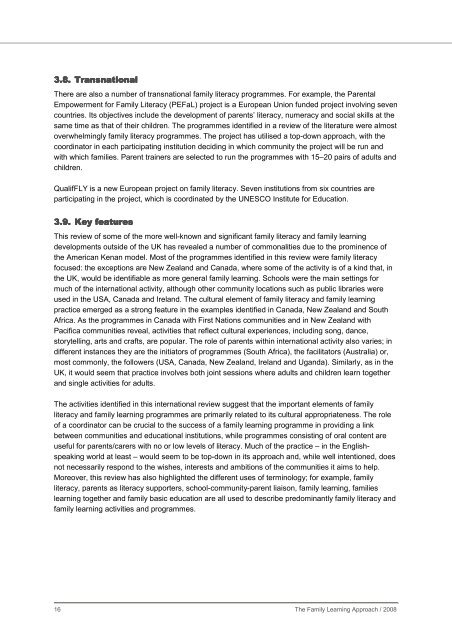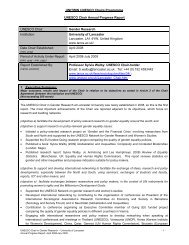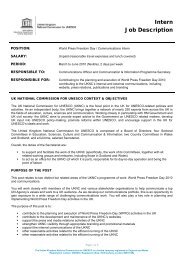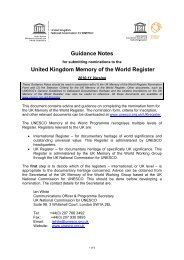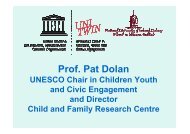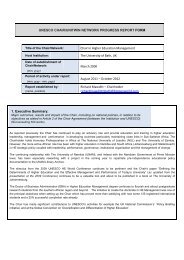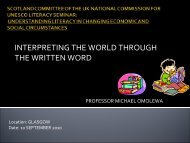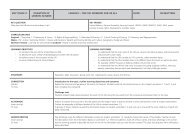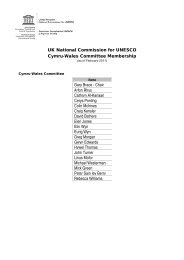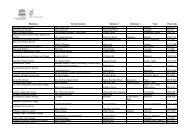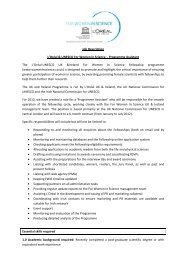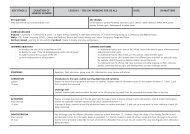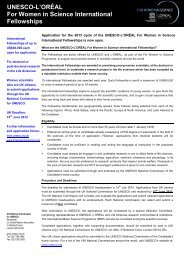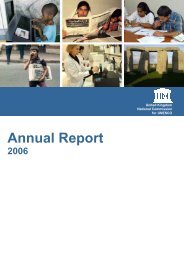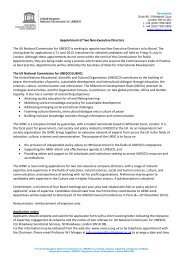3.8. Transnational<strong>The</strong>re are also a number of transnational family literacy programmes. For example, the ParentalEmpowerment <strong>for</strong> <strong>Family</strong> Literacy (PEFaL) project is a European Union funded project involving sevencountries. Its objectives include the development of parents’ literacy, numeracy and social skills at thesame time as that of their children. <strong>The</strong> programmes identified in a review of the literature were almostoverwhelmingly family literacy programmes. <strong>The</strong> project has utilised a top-down approach, with thecoordinator in each participating institution deciding in which community the project will be run andwith which families. Parent trainers are selected to run the programmes with 15–20 pairs of adults andchildren.QualifFLY is a new European project on family literacy. Seven institutions from six countries areparticipating in the project, which is coordinated by the UNESCO Institute <strong>for</strong> Education.3.9. Key featuresThis review of some of the more well-known and significant family literacy and family learningdevelopments outside of the <strong>UK</strong> has revealed a number of commonalities due to the prominence ofthe American Kenan model. Most of the programmes identified in this review were family literacyfocused: the exceptions are New Zealand and Canada, where some of the activity is of a kind that, inthe <strong>UK</strong>, would be identifiable as more general family learning. Schools were the main settings <strong>for</strong>much of the international activity, although other community locations such as public libraries wereused in the USA, Canada and Ireland. <strong>The</strong> cultural element of family literacy and family learningpractice emerged as a strong feature in the examples identified in Canada, New Zealand and SouthAfrica. As the programmes in Canada with First Nations communities and in New Zealand withPacifica communities reveal, activities that reflect cultural experiences, including song, dance,storytelling, arts and crafts, are popular. <strong>The</strong> role of parents within international activity also varies; indifferent instances they are the initiators of programmes (South Africa), the facilitators (Australia) or,most commonly, the followers (USA, Canada, New Zealand, Ireland and Uganda). Similarly, as in the<strong>UK</strong>, it would seem that practice involves both joint sessions where adults and children learn togetherand single activities <strong>for</strong> adults.<strong>The</strong> activities identified in this international review suggest that the important elements of familyliteracy and family learning programmes are primarily related to its cultural appropriateness. <strong>The</strong> roleof a coordinator can be crucial to the success of a family learning programme in providing a linkbetween communities and educational institutions, while programmes consisting of oral content areuseful <strong>for</strong> parents/carers with no or low levels of literacy. Much of the practice – in the Englishspeakingworld at least – would seem to be top-down in its approach and, while well intentioned, doesnot necessarily respond to the wishes, interests and ambitions of the communities it aims to help.Moreover, this review has also highlighted the different uses of terminology; <strong>for</strong> example, familyliteracy, parents as literacy supporters, school-community-parent liaison, family learning, familieslearning together and family basic education are all used to describe predominantly family literacy andfamily learning activities and programmes.16 <strong>The</strong> <strong>Family</strong> <strong>Learning</strong> <strong>Approach</strong> / 2008
4. FEATURES OF FAMILY LEARNING THAT COULD BE CONSIDEREDFOR SUB-SAHARAN SAHARAN AFRICAConsideration of the value of family learning <strong>for</strong> Sub-Saharan African contexts necessitates reflectionon a number of pertinent issues, including communication, culture, gender, context, language anddialect, and gaining support and involvement from the local community.Sub-Saharan Africa consists of 42 mainland countries and six island nations and is the poorest regionin the world, characterised by inter-ethnic and political conflict. <strong>The</strong> absolute poverty in which manypeople live makes it hard to imagine how family learning, which has developed primarily in wealthycountries, could be utilised in poorer contexts. <strong>The</strong>re are of course other issues that need to beconsidered when working with communities, as this section explores. However, the examples of familylearning programmes in South Africa and Uganda indicate that there is some mileage in this approach,particularly when one considers that family learning can draw in women, <strong>for</strong> example, who make upthe majority of the population without literacy, and tackle issues such as maternal health or HIV/AIDSin a geographical area that is home to more than 60% of all people living with HIV (World Bank, 2006).Robinson-Pant, in her consideration of whether ideas and approaches can be transferred, suggeststhinking why certain approaches were successful in their original context (in Barton & Papen, 2005).Barton and Papen, in their contemplation of linking literacy and numeracy courses in developingcountries and the <strong>UK</strong>, emphasise that literacy and numeracy cannot exist in a vacuum but must beintegrated with economic, social and political concerns. On the issue of transferability, they note that‘transfer is not only an issue of funding and support <strong>for</strong> programmes in the South … it is also abouttransfer of ideas between policy, practice and research within and across countries’ (2005, p. 10).Many developing societies are multilingual; what language or dialects do adults want to be taught in?As Wasik warns: ‘<strong>Family</strong> home language also needs to be respected and family wishes related to thehome language included as appropriate within the program’ (Wasik, 2004, p. 621).Gaining the trust of communities and their involvement was noted in a NALA review of family literacyin Ireland and is another important facet of effective community provision: ‘Courses which are basedon very specific models need to develop ways of responding to local strengths and needs if they are tobe very effective’ (NALA, 2004, p. 36). Programmes also need to be responsive to local communities;‘<strong>Family</strong> literacy programmes are developed through discussion with the participants. Listening tofamilies is at the heart of the process’ (NALA, 2004, p. 50). Similarly, Benseman notes, ‘Participatorymodels of planning and needs assessment firstly help ensure that the programmes are driven (at leastin part) by the learners themselves. In this way the teaching content incorporates the learners’ cultureand modes of expression’ (Benseman, 2002, p. 6). In terms of building partnerships with parents,NALA suggests that parents are involved early on, understand why the project or programme is useful,find the project interesting and supportive, feel that it promotes the well-being of their children, andparticipate in the planning, organisation and review of the programme. Research in Uganda hashighlighted, that the family may be broader than some Western perceptions (Kisira, in Barton &Papen, 2005).In the wider context of community learning, research findings from a six-month study funded by the<strong>National</strong> Research and Development Centre <strong>for</strong> Adult Literacy and Numeracy (NRDC), whichinvestigated community-focused provision <strong>for</strong> teaching adult literacy, language and numeracy,identified a number of commonalities among the communities they observed. <strong>The</strong>y found that muchcommunity-focused provision was based upon a vision. This vision was frequently a manager’s butwas shared by tutors and the organisation. This strategic view of the provision could be shared in amission statement and ‘in relation to communities and learners, meant a readiness to find ways offitting provision to learners rather than learners to provision’ (Hannon et al., 2003, p. 16). Development<strong>The</strong> <strong>Family</strong> <strong>Learning</strong> <strong>Approach</strong> / 2008 17


